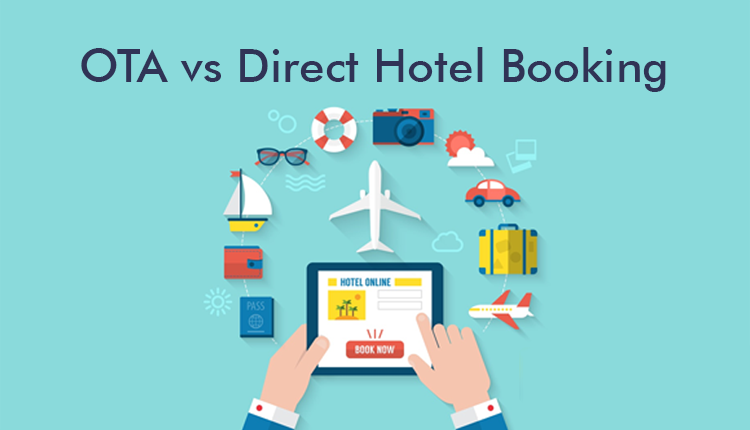Hotel distribution is a complex part of hotel business management, and in the past few years, there has been a significant transformation on this front. Online travel agents (OTAs) have witnessed both ups and downs in the market. Nowadays, many hotels prefer direct booking over booking via OTAs (online travel agents) due to loss of visibility, limited control, lack of guest relations, etc. In 2022, OTA bookings were 39%, and direct bookings were 20%. In 2023, OTA bookings were 34%, and direct bookings were 29%. This battle of “OTA vs hotel direct bookings” has put hospitality and accommodation providers in a dilemma, as they find it difficult to balance between both.
Understanding the Difference Between OTA Booking and Direct Booking
When booking accommodation, travelers often encounter two primary booking methods: OTA Booking and Direct Booking. The OTAs have gained popularity in the travel industry as a primary channel for booking hotels, while direct bookings continue to be a preferred method for many travelers. As a hotel business, understanding the pros and cons of both OTA hotel bookings and direct hotel bookings is crucial for developing an effective revenue management strategy.
OTA Booking
OTA bookings involve using third-party websites to reserve accommodations. These Hotel OTA services platforms offer a wide range of options, including hotels, flights, and activities, providing convenience and variety for travelers.
Direct Booking
Direct bookings refer to making reservations directly through a hotel or service provider’s website or contact channels. Hotels leverage channel manager software for bypassing intermediaries, customers may access exclusive deals, loyalty programs, and better customer service, fostering a more personalized experience.
The OTA vs Direct Booking Conflict
The opportunities OTAs present in terms of revenue are significant, and it is crucial for hotels not to deprive themselves of such avenues. However, hotels are still uncertain about relying on it.
Early on, hotel reservations were made directly through a phone call, walk-in, or travel agent. But over the years, things have changed. Today, there are several ways to book a hotel room, one of which is through an OTA. However, today, despite all the benefits of OTAs, hotels are getting second thoughts and considering direct bookings, as OTAs have lately increased their commissions, cutting into hotels’ profits.
That’s not all. Hotels are becoming more and more concerned about their relationship with their guests. OTAs are at the front, which might not help hotels build strong guest relationships.
Here are some pro and cons of OTA and Direct Booking:
OTA Booking (Online Travel Agency)
- Pros:
- Convenience: Easy to compare prices and amenities across multiple hotels in one place.
- Visibility: Many OTAs have a large customer base, increasing your chances of filling rooms.
- Promotions: May offer deals and discounts you can’t find on the hotel website.
- Cons:
- Cost: Hotels pay commission to OTAs for each booking, which can be up to 15%. This may be reflected in a higher room rate for you.
- Limited Control: The hotel may not have control over all the information displayed on the OTA listing.
- Guest Relationship: Communication and any special requests go through the OTA, not directly with the hotel.
Direct Booking
- Pros:
- Cost: Hotels often offer lower rates for direct bookings to avoid OTA commissions.
- Control: The hotel has full control over the information and promotions displayed.
- Guest Relationship: Allows for direct communication with the hotel for any questions or requests.
- Cons:
- Comparison: Requires more effort to compare prices and amenities across different hotels.
- Visibility: Smaller hotels may not have the same reach as OTAs.
- Promotions: May not have access to the same deals and discounts offered on OTAs.
How to Strike a Balance Between OTA and Direct Bookings to Boost Your Hotel Business?
Even though there’s a conflict between OTAs vs direct booking, you can still nurture both to grow your hotel business if you rethink your distribution strategy. The best way to go about it is by leveraging prices, policies, special offers, and providing guests with an incentive.
Here are some tips to consider:
- Offer loyalty programs to attract direct bookings and reward guests.
- Implement smart pricing strategies to optimize revenue and occupancy.
- Have an effective cancellation & refund policy to secure direct bookings.
- Optimize your website and OTA listings to drive bookings.
- Convert OTA bookings to direct bookings by offering incentives.
- Maintain a balance between OTA and direct booking strategies for growth.
- Leverage prices, special offers, and incentives to attract guests.
- Use data-driven choices for pricing and revenue management.
- Focus on seamless customer experience for direct bookings.
- Retarget former guests and personalize packages to encourage direct bookings.
Aiosell: All In One Hotel Management System for Hoteliers
We are a fully integrated cloud based Hotel Management System & ERP, helping hoteliers in enhancing their hospitality business, reducing inefficiency, operation cost and more, while improving customer experience.
At Aiosell, we offer a wide range of modules for making your hospitality business successful. You can visit our website or contact us and experience how our products like channel manager software, Property Management System (PMS), Revenue Management System (with Dynamic Pricing), Booking Engine & Website (with Google integration) and more can take your business to the next level.



